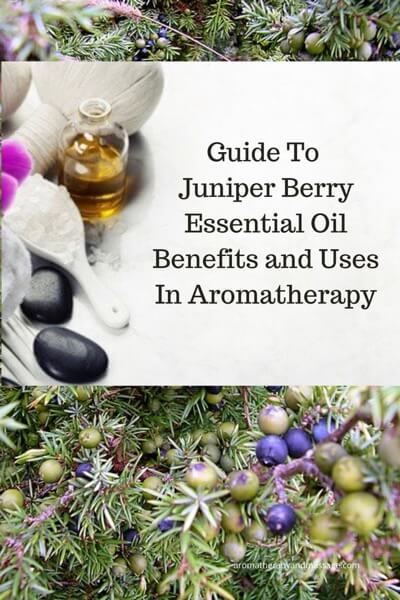- Home
- Essential Oil Profiles
- Juniper Essential Oil
As an affiliate for Bookshop, Amazon, and other programs, I may earn a small commission for products purchased through links. This doesn't affect the price you pay. Privacy policy and disclosures.
Search this site:
Guide to Juniper Essential Oil Benefits and Uses
"Juniper's task is to complete the tasks and learn the lessons," writes aromatherapist Valerie Ann Worwood in Aromatherapy For the Soul. She states the emotional benefits of juniper essential oil (Juniperus communis) are to encourage inner vision, upliftment, strength, vitality, sincerity, enlightenment, and humility.

Basic Juniper Facts
Plant family: Cupressaceae
Production: High-quality oil is steam distilled from the ripe berries of the juniper tree, a conifer. For this reason, you'll also see the oil referred to as juniper berry. Low-quality oils (best avoided) are made from fermented berries or the tree's wood.
Aroma: Crisp, woody, sweet.
Perfume/Aromatic note: Middle.
Is juniper safe to use during pregnancy? No, according to a number of different sources. But the IFPA says the oil is OK to use. Essential Oil Safety, 2nd Edition also states the oil is probably not a concern during pregnancy, and warnings against juniper are likely based on it being confused with another oil. Consult a professional.
Is juniper essential oil safe for children? Yes, for children ages 2+.
Cautions: Do not use an oxidized oil. Some sources recommend not using juniper if you have kidney problems. But Essential Oil Safety could not find evidence to support this contraindication.
Main components:
- alpha-pinene
- sabinene
- beta-myrcene
- terpinene-4-ol
- (+)-limonene
Source: Essential Oil Safety, 2nd Edition
Juniper Aromatherapy Benefits
Aromatherapy: A Complete Guide to the Healing Art: Juniper promotes digestion and may help relieve inflammation, joint pain, fluid retention, and hemorrhoids. You can use this essential oil on acne, eczema, dermatitis, boils, insect bites, inflamed and itchy skin, greasy hair, and dandruff. The oil may also help reduce varicose veins and cellulite. Emotionally, juniper helps relieve mental fatigue, insomnia, anxiety, or the feeling of being emotionally drained.
Essential Oils & Aromatherapy for Dummies: Use juniper in massage oils, liniments, and baths to help relieve pain and inflammation. The oil may improve digestion, reduce fluid retention during PMS, help get rid of congestion, relieve tiredness, and reduce anxiety. Use this essential oil in products to control acne, eczema, greasy hair, and dandruff. The oil also repels wool moths.
The Heart of Aromatherapy: Juniper provides respiratory support, especially for colds, flu, and congestion. The oil may reduce swelling, soothe sore muscles and joints, and encourage circulation and warmth. The scent supports overall energy and vitality. This oil works well in chest rubs and body butters.
The Complete Book of Essential Oils and Aromatherapy: Juniperberry may help relieve fluid retention, abdominal bloating, menstrual cramps, heavy legs, cellulite, acne, eczema, mental exhaustion, chronic fatigue, anxiety, and tension. The oil also helps relieve the pain of gout, rheumatism, and arthritis.
The Encyclopedia of Essential Oils (updated edition): Use juniper in skin care for acne, dermatitis, eczema, wounds, and oily complexions, and as a skin toner. This essential oil is also useful for reversing hair loss, and relieving the pain of hemorrhoids, gout, rheumatism, and menstrual cramps. The oil supports the immune system in cases of colds, flu, and infection and can help relieve anxiety, nervous tension, and stress-related conditions.
Aromatherapy For Healing the Spirit: In Traditional Chinese Medicine juniper stimulates yang energy, especially Kidney-yang. The oil helps relieve chronic tiredness, cold hands and feet, lower backache, fluid retention, and congestion. In TCM terms, juniper also gets rid of cold dampness, helping relieve rheumatic pain that's primarily of a cold, cramping nature. This essential oil is also beneficial for oily skin. This essential oil is energetically cleansing and deeply fortifying.
Aromatica: A Clinical Guide to Essential Oil Therapeutics, Volume I: Psychologically, juniper promotes willpower, courage, endurance, motivation, self-confidence, and positivity. Physically, the essential oil stimulates low-muscle-tone/cold conditions and decongests congestive/damp conditions. In Traditional Chinese Medicine the essential function of the oil is to strengthen the Spleen, resolve damp, and warm the interior. Two suggested blends:
- For low back pain: juniper + helichrysum.
- For muscle pain/spasm and most rheumatic conditions: juniper + rosemary ct. cineole.
- The rasa (taste) of juniper is pungent, bitter, sweet; the vipaka (aftertaste) is pungent; and the virya (energy) is heating.
- The oil generally decreases vata but can increase it in excess. Decreases kapha and increases pitta.
- Tissues most affected by the oil are plasma, blood, muscle, fat, bone, marrow, nerves, lymph, and uterus.
- Indications for this essential oil include edema, sciatica, arthritis, rheumatism, weak digestion, and painful periods.
Subtle Aromatherapy: Juniper detoxifies both the physical and subtle bodies and is especially useful for clearing away accumulated negative energy. The oil is also a space cleanser.
The Essential Guide to Aromatherapy and Vibrational Healing: Spiritually, use juniper to cleanse your aura. Mentally, use the oil to help let go of repetitive negative thoughts. Emotionally, use the oil to help release stress and relax.
Aromatherapy and Subtle Energy Techniques: Juniper is uplifting and clears unwanted and negative energies. The oil is especially useful for the second chakra to help clear accumulated emotional negativity and protect you from negative influences.
Mixing Essential Oils for Magic: Juniper purifies spaces, clears away the energy of negative people, and helps you overcome problems and release toxic emotions. You can also use the oil to support dreamwork, divination, and psychic abilities and to help manifest abundance, love, prosperity, and success.
Juniper Essential Oil Uses and Blends
Diffuse juniper to support clear breathing and for its cleansing properties.
Warm Juniper Bath Salt
Soak in a warm bath!
- 1/4 cup pink Himalayan or Dead Sea or Epsom salt
- 1 teaspoon jojoba oil
- 2 drops juniper
- 2 drops frankincense essential oil
- 1 drop myrrh essential oil
- Put the salt in a small glass container.
- Add the jojoba and then the essential oils.
- Stir gently with a glass stirring rod or the handle of a stainless steel spoon.
- Use the all the salt blend in your bath.
Source: Aromahead Newsletter
Energizing Morning Body Oil Blend
Use this body oil in the mornings.
- 2 drops juniper
- 2 drops grapefruit essential oi
- 1 drop eucalyptus essential oi
- 3 drops jasmine oil
- 1 tablespoon carrier oil
Source: 10 Recipes with Juniper Essential Oil
Woodsy Perfume Balm
Apply this perfume balm to your neck and wrist pulse points as desired.
- 1 ounce (2 tablespoons) beeswax
- 6 tablespoons jojoba oil
- 5 drops cypress essential oil
- 6 drops juniper essential oil
- 6 drops patchouli essential oil
- 4 one-ounce tins with lids
- In a double-boiler over low heat, melt the beeswax.
- Stir in jojoba oil.
- Remove blend from heat.
- Add the essential oils and stir with a glass stirring rod or the handle of a stainless steel spoon.
- Pour the mixture into tins. Place lids on tins. Let balm fully cool and harden before using (at least an hour).
Source: Essential Living
Cleaning Scrub
Use this scrub as desired to clean the kitchen sink and disposal or for hard-to-clean pots and pans.
- 1 cup baking soda
- 1 cup cornstarch
- 10 drops juniper essential oil
- 10 drops lavender essential oil
- Mix all ingredients in a bowl, combining well.
- Pour mixture into a labeled storage jar.
Source: Nikki Loscocco-VanZandt. "Spring Cleaning with Essential Oils." NAHA Aromatherapy Journal, Spring 2013.1, p. 39.
Outdoor Furniture Scrub Spray
In an 8-ounce spray bottle, combine:
- 20 drops juniper essential oil
- 20 drops lemon essential oil
- 20 drops pine essential oil
- 2 tablespoons grain alcohol
- 2 tablespoons white vinegar
Top off the bottle with water.
Shake well and spray patio furniture liberally. Use a heavy rag to clean and scrub the furniture.
Source: 150 Ways to Use Essential Oils from Edens Garden
Buy essential oils from Aromatics International (recommended).
Rocky Mountain Essential Oils.
Photo Credit: Wikimedia Commons, CC BY-SA 3.0,



